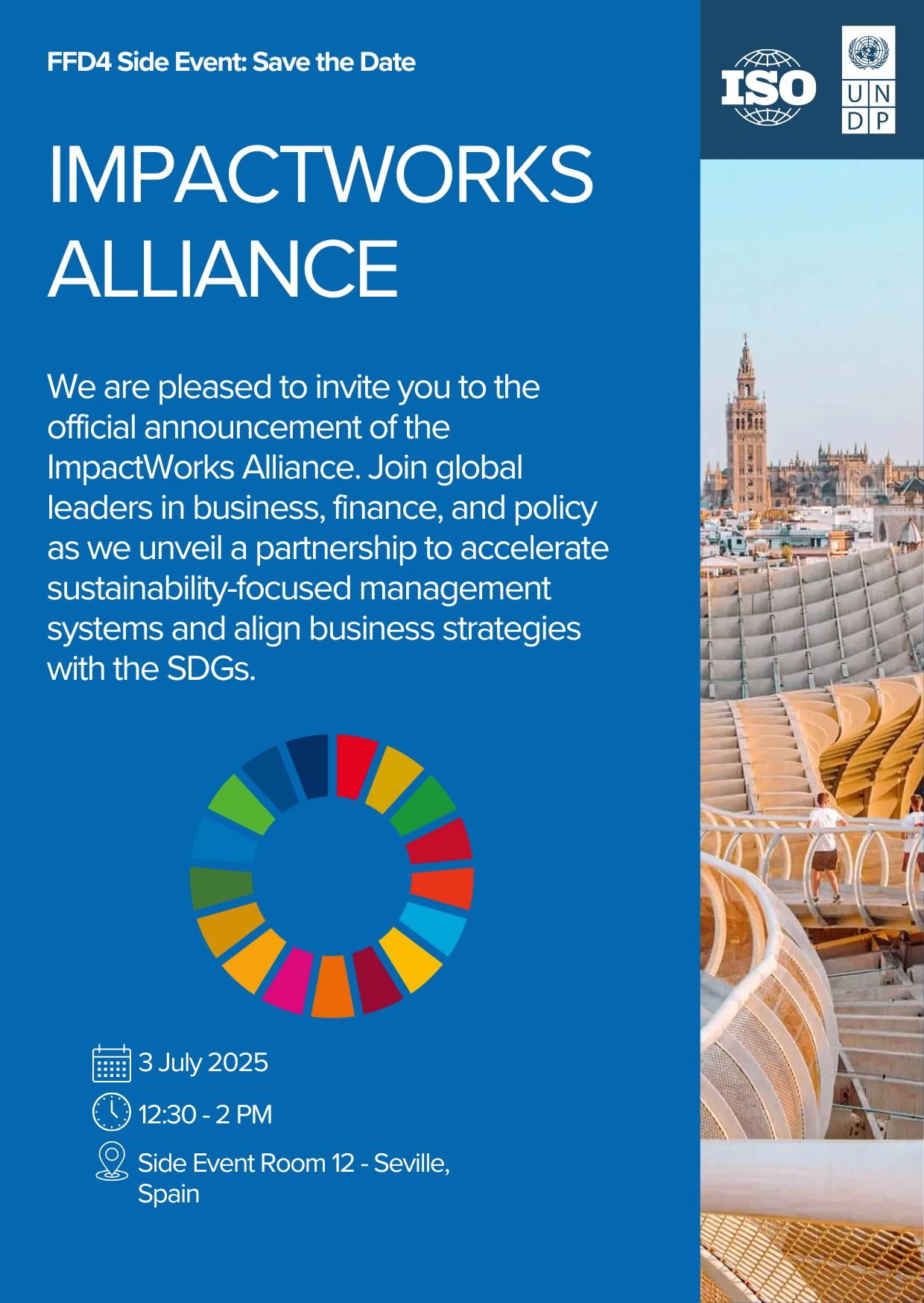Upcoming Events
Are you a CAFIID member? Share your events and we’ll post them here!

CAFIID Virtual Open House
Discover CAFIID: Engage with Canada’s Impact Investing Community

Narinder Dhami joins CAFIID’s Gender Lens Investing CoP
CAFIID Members are welcome to our next Gender Lens Investing Community of Practice Meeting

FFD4 Side Event: UNDP ImpactWorks Alliance Announcement
Save the Date
July 3, 2025
12:30-2PM
Seville, Spain
UNDP invites the CAFIID community to the official announcement of the ImpactWorks Alliance. Join global leaders in business, finance, and policy as we unveil a partnership to accelerate sustainability-focused management systems and align business strategies with the SDGs.
The ImpactWorks Alliance is a global partnership for action on sustainability, initiated by the United Nations Development Programme (UNDP) and the International Organization for Standardization (ISO), in collaboration with Social Value International (SVI). It aims to inspire a shift in private sector leadership, aligning profit with social and environmental outcomes to improve the well-being of people and planet.
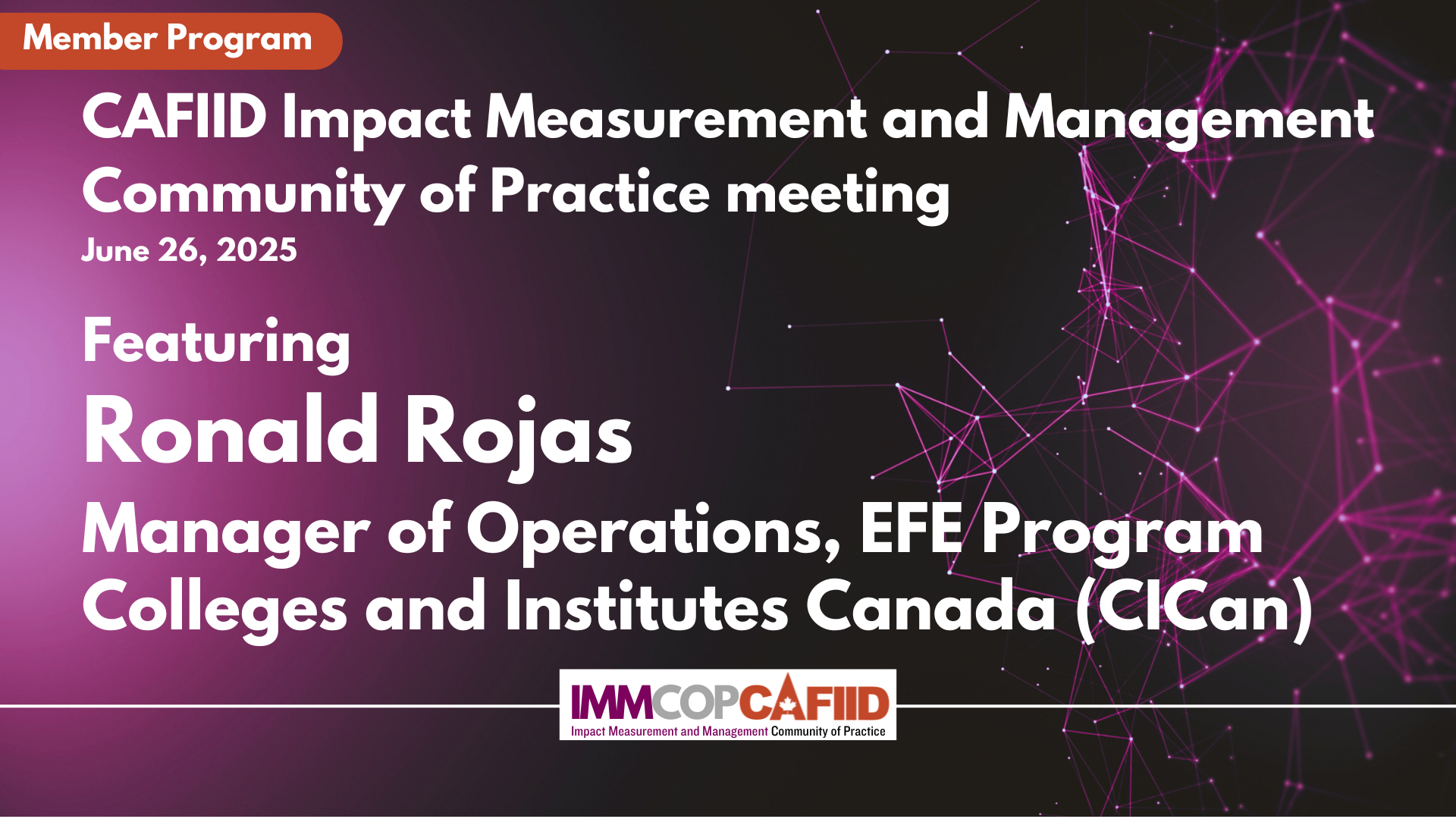
Colleges and Institutes Canada (CICan) joins CAFIID’s Impact Measurement and Management Community of Practice
CAFIID Members are welcome to our next Impact Measurement and Management Community of Practice Meeting


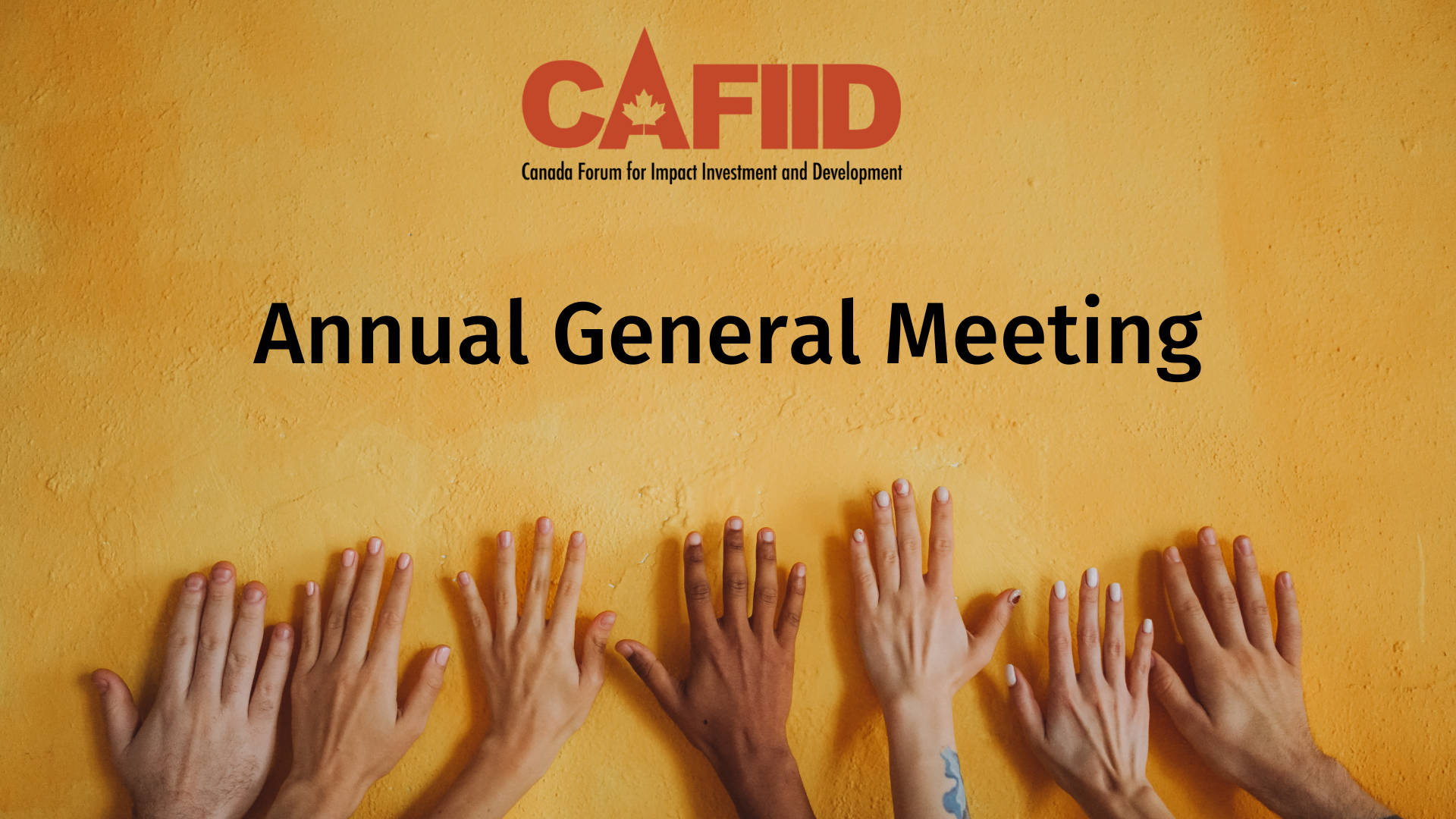

Go Parity joins CAFIID’s Climate Finance Community of Practice
CAFIID Members are welcome to our next Climate Finance Community of Practice Meeting

EHA Impact Ventures and MotherFood International join our Gender Lens Investing Community of Practice
CAFIID Members are welcome to our next Gender Lens Investing Community of Practice Meeting

Cross Border Impact Ventures joins CAFIID’s Impact Measurement and Management Community of Practice
CAFIID Members are welcome to our next Impact Measurement and Management Community of Practice Meeting

Montreal: Nurturing Resilience Together / Cultiver la résilience, ensemble
Le 28 mai prochain, SOCODEVI, en partenariat avec le Fonds international de développement agricole (FIDA), vous invite à une matinée d’échanges ancrée dans les réalités du terrain et tournée vers l’action. Joignez-vous à nous pour une conférence mobilisatrice réunissant des experts-es autour d’un enjeu clé : renforcer le développement économique rural grâce à des approches de gestion des risques agricoles, de finance d’impact, de partenariats durables et de solutions locales.
Cet événement bilingue aura lieu le 28 mai prochain, de 8 h 45 à 13 h 30 à la Maison du développement durable (50 rue Sainte-Catherine ouest, Montréal) en personne seulement. Un enregistrement sera publié en ligne dans les jours suivants.
Plus de détails ici : https://socodevi.org/cultiver-la-resilience-ensemble/
On May 28, SOCODEVI, in partnership with the International Fund for Agricultural Development (IFAD), invites you to a morning of exchanges grounded in real-world experiences and focused on action. Join us for a dynamic conference bringing together experts to address a key issue: strengthening rural economic development through agricultural risk management, impact finance, sustainable partnerships, and local solutions.
This bilingual event will take place in person only on May 28, from 8:45 a.m. to 1:30 p.m. at the Maison du développement durable (50 Sainte-Catherine Street West, Montreal). A recording will be made available online in the days following the event.
More details available here:
https://socodevi.org/en/cultivating-resilience-together/

Montréal: Au-delà du climat : investir pour un impact intégré / Beyond Climate: Investing for Integrated Impact
CAFIID Special Event in Montreal - Open to all!

Systemic Investing: An Opportunity for Canada
Event details:
Join Impact United Academy, TwinRiver Capital, and Ontario Trillium Foundation for the launch of an exciting new event series delving into systemic investing and its transformative potential within Canada’s impact investment landscape.
This session will open a conversation on how the emerging field of systemic investing might contribute to better resourcing a range of interventions to tackle systemic challenges in Canada. Ilse Treurnicht, Managing Partner at TwinRiver Capital, and Tracey Robertson, Innovation Lead at Ontario Trillium Foundation, will set some context and host a conversation with other attendees of the recent Systemic Investing Summit in London (UK), to highlight key takeaways relevant to Canada’s growing impact community.
Together, we’ll examine how this emerging approach is reshaping investment strategies across complex systems—ranging from climate and health to social equity—and what it means for practitioners, funders, and innovators committed to deep and durable change.

Panel Discussion: VC Climate Investments in Canada
CAFIID Members are welcome to our next Climate Finance Community of Practice Meeting
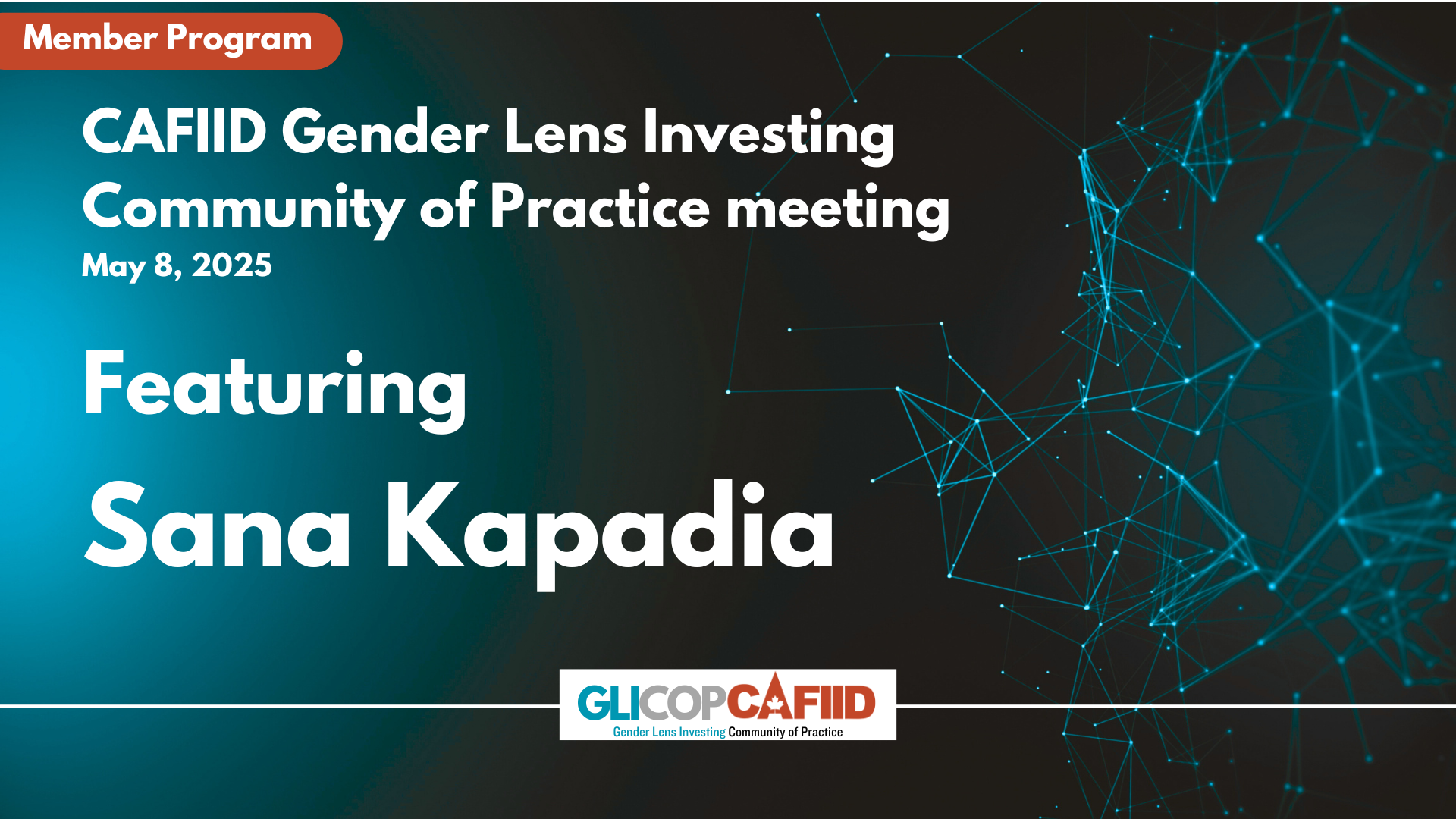
Gender Lens Investing CoP meets with Sana Kapadia, Chief Catalyst at Heading for Change
CAFIID Members are welcome to our next Gender Lens Investing Community of Practice Meeting

The Future of Results-Based Accountability — Leveraging AI for Greater Impact
Event details:
Join us for an exclusive webinar featuring Mark Friedman, Director of the Fiscal Policy Studies Institute and creator of Results-Based Accountability (RBA), alongside Adam Luecking, CEO of Clear Impact and author of Social Sector Hero — How Government & Philanthropy Can Fund for Impact. In this session, Mark will provide a brief overview of the RBA framework, while Adam will showcase how Clear Impact’s Scorecard AI Assist tools can help organizations:
Develop data analysis and assistance in forecasting
Enhance narrative development of the story behind the curve
Boost brainstorming and idea development around Partners and “What Works” to turn the curve.
Event is online and great for everyone working and/or interested in the impact measurement and management space, funders, grantmaking organizations, impact investing firms.



Ottawa/Hybrid Event: Innovative Financing for Nature-based Solutions in Mangrove Communities
A hybrid AKFC Climate Speaker Series event with CAFIID, exploring innovative financing to scale community-led Nature-based Solutions in mangrove ecosystems

Mauricio Rincon from Opportunity International joins CAFIID’s Climate Finance Community of Practice
CAFIID Members are welcome to our next Climate Finance Community of Practice Meeting

Reimagining resourcing for social transformation
Join Equality Fund and the Criterion Institute to explore how endowments can shift power in gender lens investing and drive systemic change. Let’s rethink capital & equity!

Sawa Nakagawa, Executive Director of the AlphaMundi Foundation joins CAFIID's GLI CoP
CAFIID Members are welcome to our next Gender Lens Investing Community of Practice Meeting
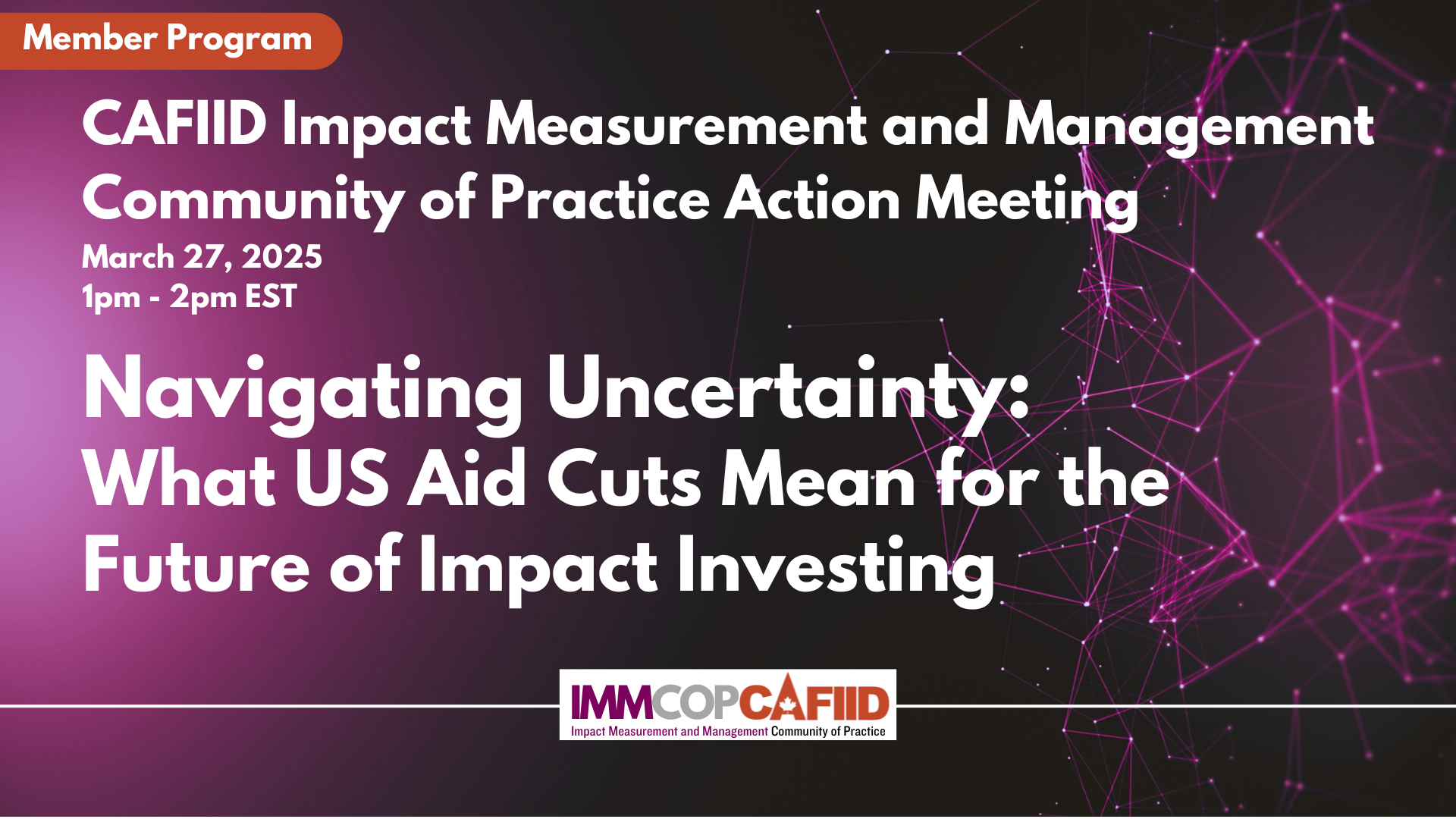
IMM Community of Practice Action Meeting - Navigating Uncertainty: What US Aid Cuts Mean for the Future of Impact Investing
CAFIID Members are welcome to our next Impact Measurement and Management Community of Practice Meeting
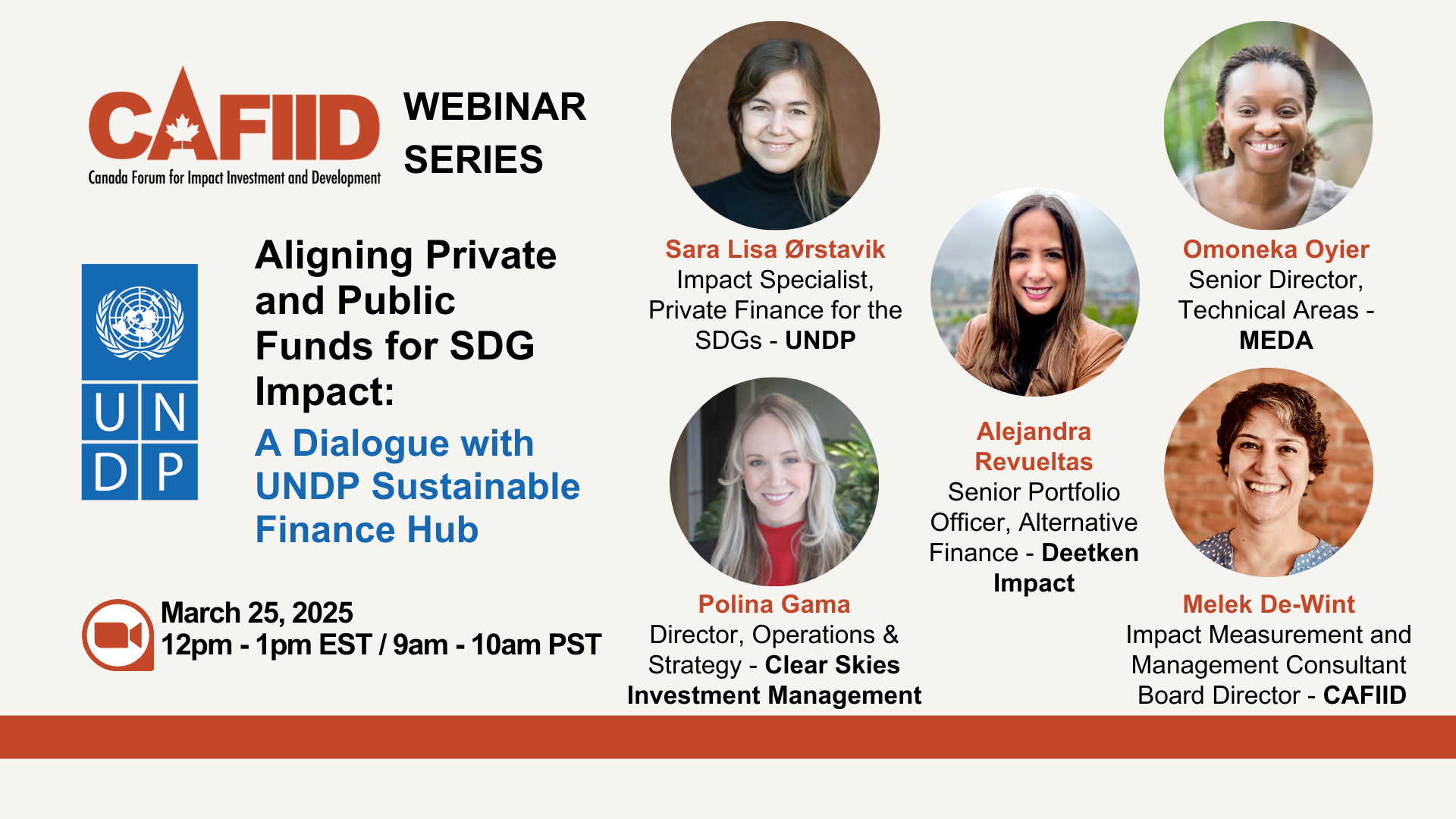
Aligning Private and Public Funds for SDG Impact: A Dialogue with UNDP Sustainable Finance Hub
This webinar will focus on standards and guidelines for managing and optimizing impact on sustainable development and explore their crucial role in aligning private and public funds to achieve the Sustainable Development Goals (SDGs)



FinDev Canada joins CAFIID’s Climate Finance Community of Practice
CAFIID Members are welcome to our next Climate Finance Community of Practice Meeting

CSSB Strategic Plan 2025-2028: A Collaborative Consultation
Join us for a virtual feedback session on the Canadian Sustainability Standards Board (CSSB) Proposed 2025-2028 Strategic Plan, hosted by CAFIID and the CSSB.
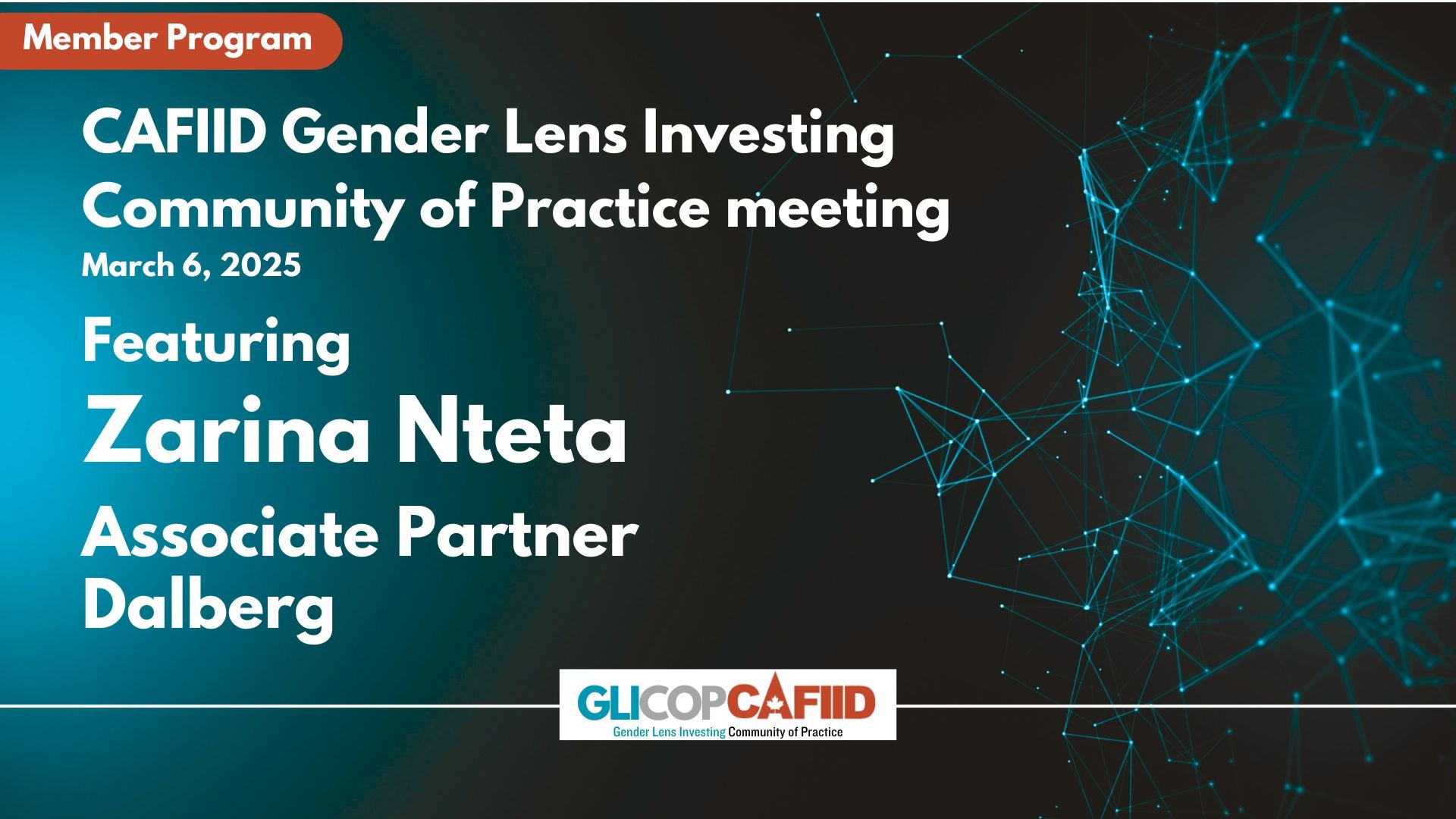
GLI Community of Practice Meeting - Featuring Dalberg
CAFIID Members are welcome to our next Gender Lens Investing Community of Practice Meeting



